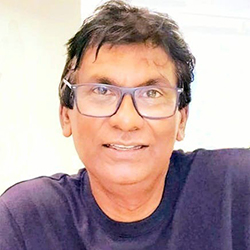Publicité
Interview
Sansjiv C. Nuckchady: “Seed Transformation Program will help local entrepreneurs to grow and scale their businesses”
Par
Partager cet article
Interview
Sansjiv C. Nuckchady: “Seed Transformation Program will help local entrepreneurs to grow and scale their businesses”

Sansjiv C. Nuckchady, Stanford Seed Coach.
Sansjiv Nuckchady is an insurance professional, both in Mauritius and in mainland Africa. However, for several years now, he has been wearing a different hat as a business strategist. He is currently acting as coach for the Stanford Graduate School of Business in its Seed Transformation Program across Africa. He shares the main concepts to ‘‘l’express’’.
From being an insurance professional to being a business strategist, was it a difficult transition?
I believe that we are all strategic thinkers in our everyday life… except that we are not conscious of the fact. In the business world, strategic planning is a concerted management team effort guided by the company’s mission. Personally, I have been passionate about strategic reviews, planning and implementation for a long time and the interest peaked when I read Good to Great by Jim Collins some 20 years back. This prompted more studies and research in this field. However, I need to admit that experience played a major role in lifting the veil.
In a nutshell, what is the Seed Transformation Program?
I first learnt of the Seed Transformation Program when I was working in Ghana in year 2017. It is an initiative of the Stanford Graduate School of Business contributing to end the cycle of global poverty. To make it happen, they partner with entrepreneurs in emerging markets to help them build thriving socially-conscious enterprises. This has a ripple effect through creation of jobs, positively impacting on the community and the economy at large.
How does this program differ from other business management programs?
The approach is totally different. Whist the course content is similar to an MBA program, it is your own company which is being used as case study. Furthermore, the top management team gets to participate in several sessions along with the business leader. Hence, there is a team effort in scaling and strengthening the company.
The program, held over 10 months (a mix of in-person and online delivery), is based on a world-class curriculum led by the Stanford Graduate School of Business faculty. The business leader and his team get to attend workshops to develop their skills, tools, and mindset to grow the business; they end up with a detailed transformation plan to be actioned. At the end of the program, the business leader becomes a member of the Seed Transformation Network, a group of over 1,000 peers from 30 countries, for continued engagement, learning and business collaboration.
You seem very enthusiastic about this program which you want to share with the local business leaders…
It is difficult to be otherwise once you are aware of how ingeniously this program is structured. There is a general belief that obtaining an MBA is like winning the grail in business management. Whilst there are lots of benefits to an MBA, there are also shortcomings which become very apparent when the MBA holder tries to apply theories learnt into practice. For example, whilst you get to learn from case studies such as Amazon, Nestle and TNT, this is far from the reality in emerging markets. There is also the fact that running an enterprise is not a solo job. It is always difficult to try and implement things which you have learnt in the classroom, when your peers have not been exposed to same; the buy-in can be a big challenge.
Can our Chief Executives benefit from the Seed Transformation Program?
Yes, since year 2022, this program is available to companies in Mauritius. However, I must point out that it is intended for CEOs or founders of established companies with an annual revenue between US $300,000 and US $15 million. This criterion helps to separate those companies which are still in the nitty-gritty of business start-ups, and target those which are stable and are ready to move to another level. I must also add that this program is open to companies from any sector, be it finance, IT, healthcare, agribusiness, services, food, manufacturing etc.
Presently, applications are being processed for the 2025 cohort. I expect that many Mauritian entrepreneurs will grab this opportunity to scale their business through the Stanford Graduate School of Business faculty.
What about the cost of joining or subscribing to this program?
It’s not expensive to join this program, the current fee being currently US $9,500 for the 10-month program. It is surprisingly cheap thanks to the generosity of the founding donors Robert and Dorothy King and many others. In Botswana, Namibia, and South Africa, the cost of the program is subsidized by the De Beers Group. I need also to mention that there are scholarships available to women founders, and social entrepreneurs.
And for those companies which have not reached US $300,000 as annual revenue, will they be eligible for the program?
There are other Stanford programs such as Seed Spark and Aspire which target early-stage entrepreneurs. These are quite new programs which would soon be available in Mauritius.
Seed transformation program
Seed is an initiative of the Stanford Graduate School of Business working to end the cycle of global poverty. Launched in 2013, it is a business transformation program targeting entrepreneurs from high-potential start-ups as well as established companies in emerging economies, keen to take their businesses to the next level. From covering Sub-Saharan Africa and South Asia, the program has now been extended to Indonesia. To date, more than 1,000 businesses have benefited from this program, and the business leaders are part of a network for ongoing learning and collaboration.
Publicité
Publicité
Les plus récents






